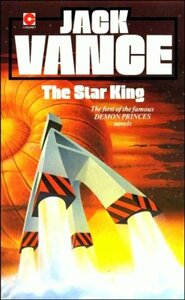Take a photo of a barcode or cover
This is, by Vance's standards, a straightforward adventure story. In fact, it's comfortably the most coherent Vance novel I've read. My introduction to him was the beautifully weird Lyonesse, in which he started writing a conventional fantasy adventure then got bored a quarter of the way in and took a series of sharp left turns until he was left writing something more akin to Alice in Wonderland. The Cugel books, too, are essentially a series of linked short stories rather than conventional novels.
So, The Star King is straightforward, and as a result lacks some of the shocking oddness that made me love, say, Lyonesse; but it's still a great book, an exciting and inventive sci-fi adventure (with a Kill Bill-style revenge storyline) told in Vance's sardonic, dry manner, and with touches of his cold cruelty. One of the better books I've read recently.
So, The Star King is straightforward, and as a result lacks some of the shocking oddness that made me love, say, Lyonesse; but it's still a great book, an exciting and inventive sci-fi adventure (with a Kill Bill-style revenge storyline) told in Vance's sardonic, dry manner, and with touches of his cold cruelty. One of the better books I've read recently.
adventurous
mysterious
medium-paced
Plot or Character Driven:
Plot
Strong character development:
No
Loveable characters:
No
Diverse cast of characters:
No
Flaws of characters a main focus:
Complicated
I normally like Jack Vance, but this one didn't really grab my interest. It didn't help that I was listening on the Hoopla app and the playback quality was terrible.
adventurous
mysterious
tense
medium-paced
Plot or Character Driven:
A mix
Strong character development:
Yes
Loveable characters:
Yes
A rambling, pulpy story, heavy with "Aren't I, the author, so very clever" kind of exposition and cardboard characters that make it feel way longer than it actually is. Vance's protagonist is so terribly uninteresting and lazily written--he feels a lot like an early version of "empty shell" characters like Bella from Twilight or Shadow from American Gods, that supposedly let the reader insert themselves into the protagonist. GRRM apparently recommends this series to fans, and while we might chalk that up to GRRM being an old man with old man tastes, I can see how a work like this influenced him--and I don't mean that flatteringly. Since GRRM praises Vance as some kind of GOAT, we can assume Vance has had major influence on GRRM and it would seem works like this is where GRRM got his license to include some of the more regressive elements of his own worldbuilding.
What's interesting to me here is when this was published in the evolution of SF lit: 1964. Vance had just won the Hugo for a short story the year before, so you'd think he was at his best. Yet in many ways this is an incredibly unambitious, even regressive work for that time and for an author with as much experience as Vance. Vance started publishing in 1950, and here he was some 14 years later, writing lazy, conventional pulp SF that feels a decade older than it is. Why I find this interesting is what was about to happen in SF lit: New Wave, which was a very conscious break from the older pulp style of writing of the 1950s toward broader and more literary styles and elements. Over the next few years, several emerging SF authors would start to deliberately steer the course of SF away from what Vance was doing in this novel, while Vance would go on to write 4 more installments of this series, which I will assume are just as pulpy and unambitious as this one. So I don't think it's much a mystery why readers today likely know New Wave names like Ellison, Le Guin, Herbert, Lem and Zelazny, but may not have heard of Vance without a champion like GRRM.
What's interesting to me here is when this was published in the evolution of SF lit: 1964. Vance had just won the Hugo for a short story the year before, so you'd think he was at his best. Yet in many ways this is an incredibly unambitious, even regressive work for that time and for an author with as much experience as Vance. Vance started publishing in 1950, and here he was some 14 years later, writing lazy, conventional pulp SF that feels a decade older than it is. Why I find this interesting is what was about to happen in SF lit: New Wave, which was a very conscious break from the older pulp style of writing of the 1950s toward broader and more literary styles and elements. Over the next few years, several emerging SF authors would start to deliberately steer the course of SF away from what Vance was doing in this novel, while Vance would go on to write 4 more installments of this series, which I will assume are just as pulpy and unambitious as this one. So I don't think it's much a mystery why readers today likely know New Wave names like Ellison, Le Guin, Herbert, Lem and Zelazny, but may not have heard of Vance without a champion like GRRM.
adventurous
tense
fast-paced
Plot or Character Driven:
Plot
Strong character development:
No
Loveable characters:
Yes
Diverse cast of characters:
Yes
Flaws of characters a main focus:
No
medium-paced
Plot or Character Driven:
Plot
Strong character development:
No
Loveable characters:
No
Diverse cast of characters:
No
Flaws of characters a main focus:
No
I love Vance's writing and world-building, and the Kill Bill-like story of revenge was well done. I know the book is dated, but the treatment of the single female character definitely has me miffed.



